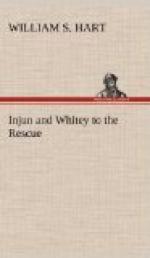Injun and Whitey’s jobs were to hold the sacks into which the grain fell. And there they worked, from sunup to sundown, in the heat, and the dust from the chaff, with never a murmur. They were happy because it wasn’t work, it was an adventure, with expectancy and danger in it. And Gil Steele was happy, because he was practically getting the work of two men for the pay of two boys.
The sleeping quarters in the Hanley Ranch were altogether taken up by the extra help required to feed the threshers. So the threshers themselves occupied tents, and it was in one of these that Whitey and Injun were bedded, much to their joy. It fitted in with their plans to watch Dorgan, and see if they could learn something that would confirm their suspicions of him.
So far Dorgan had been an utter disappointment. Not only had he refrained from beating it, but he had greeted the boys pleasantly when they met. As far as outward appearances went, Dorgan might have been a Sunday school superintendent. Had he been one at heart, there would be no more story for me to tell.
But there were times when Dorgan could be forgotten. With a crowd like that gathered on the Hanley Ranch, you can imagine the yarns there were to spin in the long evenings, with nothing to do but spin them. Perhaps some of the tales those men didn’t dare to tell—the secrets hidden behind their hardened faces, the faults, the crimes, the horrors that could have been revealed—these might have proved more thrilling than the stories that came forth; but that is something that neither you, nor Whitey, nor I will ever know.
The tales that were told there had the proper setting, and if you have thought much about stories you know what that means. You tell a ghost story late at night, seated before a fireplace in an old country house. The only light comes from the flames of the dying fire logs that flicker as the wind howls down the chimney; the only sounds, the beating of the rain on the walls and roof, and—during the creepy pauses in the yarn—the creakings that a lonely house gives out in the night hours. Tell that same story on a sun-lighted June morning, in the orchard, when the trees are all in blossom. Oh, boy! you know the difference.
One night when Whitey had been to the ranch house on an errand, he returned to the tent to find a disturbance going on. Dorgan, who slept in another tent, was a visitor. Somewhere he had obtained liquor; under its influence his pleasant manner had fled, and he was picking on Injun. The dislike that Dorgan concealed during his sober moments had reached the point at which he demanded that Injun be put out of the tent. It was a place for white men, not for Injuns. Injun was not afraid of Dorgan, and had no idea of leaving, so Dorgan was going to put him out. Injun wasn’t going to let Dorgan put him out.
At this moment Whitey arrived. What would have happened to an unarmed boy against a drunken, armed man or to two unarmed boys, for Whitey started to interfere, is something else we never shall know, for a cowboy put in his oar.




